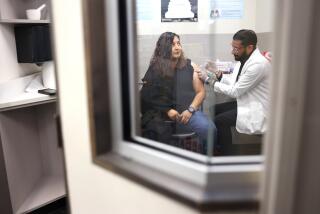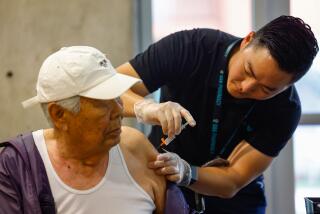Amid flu-shot crisis, don’t forget the ‘other’ vaccine
- Share via
WASHINGTON — The flu-shot shortage makes it more imperative for elderly Americans to get a second, often overlooked vaccine that protects against a type of pneumonia germ that’s a common complication of flu.
Called pneumococcal vaccine, it’s a one-time shot for anyone 65 or older. Younger people with heart and lung diseases, diabetes or weak immune systems need it too.
It’s not a replacement for a flu shot; high-risk patients should continue trying to find that.
But many of the same people most vulnerable to flu also are at high risk from this dangerous bacterial infection. They need the pneumococcal vaccine anyway -- and this fall marks a good time to go ahead and get it, especially if they can’t find a flu shot.
“Absolutely,” says Dr. Gregory Poland of the Mayo Clinic, who advises the government on pneumococcal vaccine. “It’s a good backup to prevent the complications of influenza.”
Despite its name, the vaccine protects against more than pneumonia. It also prevents deadly blood infections and meningitis caused by a bacterium called pneumococcus.
Data show that each year, 175,000 Americans are hospitalized with pneumococcal-caused pneumonia. The germ also causes more than 50,000 blood infections and up to 6,000 cases of meningitis. Almost 6,000 die.
A childhood vaccine, Prevnar, has proved very effective at battling seven pneumococcal strains common in babies and toddlers. But millions of adults are at high risk from additional strains of the germ and need the adult version, according to the Centers for Disease Control and Prevention. They are:
* Everyone 65 and older.
* Anyone with diabetes, heart disease, chronic lung disease except asthma, chronic liver disease or kidney failure.
* Anyone with weakened immune systems from cancer, HIV or organ transplants.
* People without a functioning spleen or who have sickle cell disease.
* Residents of long-term care facilities.
Every fall, the CDC urges those at risk to get the vaccine, Pneumovax -- a call this year overshadowed by the flu-shot crisis. The government hopes to have 90% of seniors vaccinated against the disease by 2010, but just 63% are now. Even fewer of the younger high-risk patients are thought to be protected.






